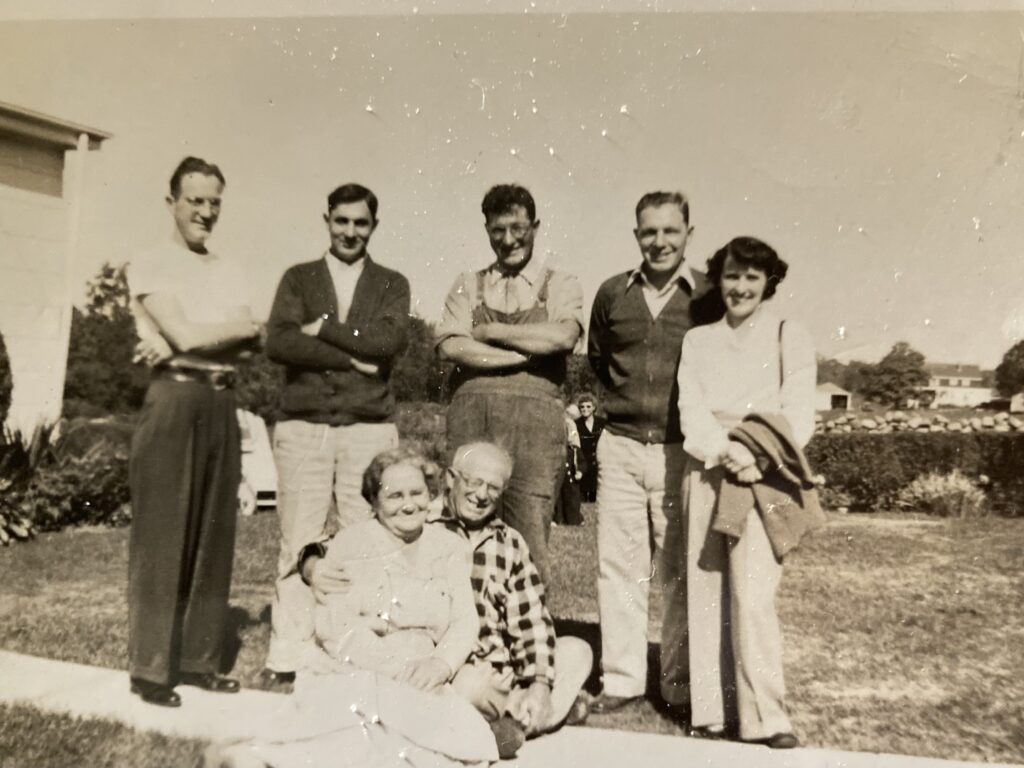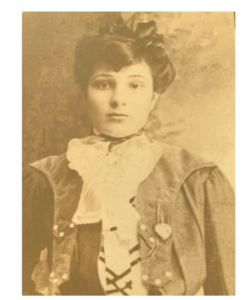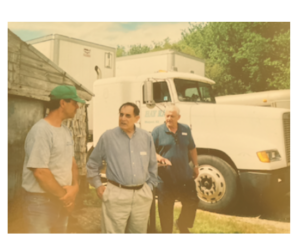Raposa Westport Family Farm by Sharon Raposa

Raposa Family
Raposa Westport Family Farm
Deed in hand for his new Westport farm on Main Road a young 20 year old American- born Portuguese man, my grandfather Manuel Raposa, embarked on a long sailing adventure out of the port of Boston to Saint Michael’s in the Azores, to fulfill a promise. It was in the late 1890s. Previously Manuel had gone to his family ‘s homeland on vacation and met Angelina Botello , the 19-year-old daughter of a prosperous Azorean cattle farmer, who also owned a vineyard on the mainland of Portugal. When the young Westport man asked for Angelina’s hand in marriage, her father brushed him off as just a landless American guy. Not to be deterred, Manuel had since bought the hundred acre Westport farm at 1077 Main Road and was ready to prove his viability on this visit.
Meanwhile, Angelina diligently studied the English language in preparation for living in her new country. Her friend Capitalina also married a Westport farmer named Manuel Lewis whose Adamsville Road Farm was adjacent through the woods from the Raposa farm.

Angelina Bothelo Raposa at 19 before coming to America
Once in America, these two friends met regularly at the brook between their properties to discuss matters of the day. Neighboring single farmer Oscar Palmer, a well-known Westport Selectman in his day, who frequented the Raposa’s dinner table for his favorite Portuguese meals , named the Angeline Brook In Angelina’s honor.
The Raposa farm was located down a long lane on Main Road until a severe lightning storm set the home on fire. Local farm families came to the rescue in rebuilding their home and barns. It was decided to rebuild the home closer to Main Road for easier access for the nine children , seven boys and two girls , to walk to school at the Point. Later it was discovered the home that burned was built on an old Indian burial. Some say, that was the reason for the fire.
School life for the children meant walking the 4 miles each way to the Point school. Stopping by at Katherine Hall’s home library on Scotch Pine Lane to choose a book was the highlight of their week . Miss Hall also treated the kids to stories about animals and visits to her home aviary, along with milk and cookies too.
Farm life was hard for women like Angelina . Up at 4 AM every morning she made bread in preparation for breakfast set for nine children plus farmhands. Then she canned vegetables , tended the herb garden , filled the root cellar for winter and fed small animals, mostly goats and chickens. Cleaning house, washing clothes by hand came next before preparing yet even more meals for lunch and dinner . Listening to the radio ,and television much later in the 1950s , occupied her times of rest. She frequently wrote to her family in the Azores, but sadly never returned to visit and never saw them again. Angelina, who didn’t drive a car and had a terrible carsick condition ( inherited by all her granddaughters) walked to church every morning for over 50 years.
Healthcare in the early 1900s consisted of growing your own herbs to treat ailments like upset stomachs and headaches as well as poultices for cuts and abrasions.
When regular doctor visits were called for it wasn’t until the 1940s when Dr King of Adamsville, Dr Taylor of Sakonet and Dr Von Trapp , (youngest son of the famous musical family ), were available for house calls. Preferred payment to Dr Von Trapp for these medical visits were large pots of Portuguese kale soup to feed his large family.
Angelina was proud of her lovely, formal dining room with French doors off the living area where fine china and lace tablecloths adorned the room only to be used on Sundays for meals like roast beef or chicken along with homegrown veggies and pies.
The Raposa kids enjoyed visiting with other local farm kids and frequently helped out with bringing in the hay or trading cows or other cattle as it was fun for them to see school friends especially in the summer.
The dairy farm cows ,mostly Guernsey with some Dutch belt , were very good milk producers. The secret was classical music, playing on the radio in the barn during milking the cows. Clydesdale horses before the days of tractors were used to plow the fields. Other horses were pets that the boys rode for pleasure, as well as to herd cows from the pasture into the barn for the night. Favorite dog Kelly, while not a herding dog, learned to bring cattle in from the pasture from their old herding Airedale dog.
When the boys weren’t doing farm chores or fixing farm equipment, they spent time playing baseball , ice-skating, going to picnics on the beach, riding their horses or visiting friends to rake up seaweed at Horseneck beach to enrich the garden soil.
Social life revolved around Saint John the Baptist Church, once the local Catholic Portuguese farmers decided to build it themselves and hire a priest, since the local diocese had refused to bring a Catholic Church to Westport.
When during World War II, the patriotic farm boys of Westport volunteered to fight, the Raposa boys all went to sign up. After so many farm boys had been lost from the Westport Wood , Tripp and other American farm families the Raposa boys were told to go back home to run the farm instead. Needless to say they felt rejected.
The Raposa girls, youngest, Laura, an older Mary, (aka Mame), started a farmstand to sell their homegrown produce, ranging from blueberries and raspberries to lettuce, tomatoes and potatoes from their garden. One summer day, a large black sedan stopped out front at the farmstand, and a chauffeur asked if big sister Mame would be willing to wash and iron several men’s white shirts weekly during the summer. Mame agreed and was elated to have a real job. The crumbled white shirts arrived on Friday wrapped in paper and Mame had the fresh shirts ready that had been left from last week. Curiosity as to who owed these lovely shirts was finally resolved when the big black sedan appeared at summer’s end and when the backseat window rolled down the man who handed her a $20 bill was President Roosevelt.
Despite a depression and war , times were apparently good as local farmers grew their own food and shared veggies , chickens and meat with city relatives . Manuel even succumbed to son Ben’s passion for speed when he bought him an Indian motorcycle . Before long, Ben was flying his own airplane that frequently scared the cows when landing in a nearby pasture. Unfortunately Ben never learned that cows don’t produce milk when they are rattled by noise and approaching danger.
Manuel and Angelina were thrilled to have seven sons to run the farm as well as two girls to help out around the house. Little did they realize in just a few years the Raposa kids would be leaving for greener pastures. Ben, Mame , and Laura left for California , while Tony and Jerry went to college in New York City. Jim, Tony , George, John and Manuel remained locally and became business owners. Nineteen grandchildren and 20 great grandkids survive.
While the seven Raposa boys courted local farm girls , three married into Westport farm families . Tony married Evelyn Almeida from The Brownell Farm in Sanford Road in 1938 . Ben married Marianne Azevedo from Old County Road in 1936. George married Agnes Whittle in 1935. Agnes , best known as the founder of The Schwartz School for handicapped children (and Skip Manchester’s Grandmother), came from a rum running family who ran scotch with the Kennedy family.

Hay Ray with Great Uncle Tony and Uncle Buzz (aka Buzz) at the barn in 2000
The Raposa dairy farm prospered during the early 1900s through the 1960s despite the all sons leaving . Hired help ran the farm under Manuel gentleman farmer’s management . His sons called him The Old Gent. His namesake son moved to the farm to care for him in later years . The farm lay fallow for years until great grandson Ray, aka HayRay, a natural born farmer , revived the farm property to support his specialty hay business and love of raising Shetland horses with wife Tina. Today Ray operates a feed store while serving on town boards that support the Westport farming community .
